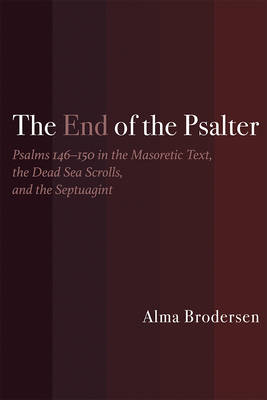
- Afhalen na 1 uur in een winkel met voorraad
- Gratis thuislevering in België vanaf € 30
- Ruim aanbod met 7 miljoen producten
- Afhalen na 1 uur in een winkel met voorraad
- Gratis thuislevering in België vanaf € 30
- Ruim aanbod met 7 miljoen producten
The End of the Psalter
Psalms 146-150 in the Masoretic Text, the Dead Sea Scrolls, and the Septuagint
Alma BrodersenOmschrijving
Psalms 146-150--sometimes called the "Final Hallel"--are often thought to comprise an end to the Psalter. Frequently seen as connected to other psalms through catchwords that act as both literary and theological links, these final psalms are thought to originally, and deliberately, close out the entire book of psalms. However, Alma Brodersen questions this purported function of these psalms.
The End of the Psalter presents new interpretations of Psalms 146-150 based on the oldest extant evidence: the Hebrew Masoretic Text, the Hebrew Dead Sea Scrolls, and the Greek Septuagint. Brodersen analyzes each psalm separately in all three sources, complete with a translation and detailed comments on form, intertextuality, content, genre, and date. Based on this rigorous analysis, Brodersen makes detailed comparisons of the individual psalms and their intertextual references that highlight substantial differences between the transmitted texts.
Brodersen concludes that Psalms 146-150 were separate texts, which only came to form the end of the Psalter in the Masoretic tradition. Her work underscores the importance of "psalms exegesis" before "Psalter exegesis," and illustrates how the use of ancient sources furthers the understanding of the Psalms.
Specificaties
Betrokkenen
- Auteur(s):
- Uitgeverij:
Inhoud
- Aantal bladzijden:
- 332
- Taal:
- Engels
Eigenschappen
- Productcode (EAN):
- 9781481308991
- Verschijningsdatum:
- 1/08/2018
- Uitvoering:
- Paperback
- Formaat:
- Trade paperback (VS)
- Afmetingen:
- 152 mm x 229 mm
- Gewicht:
- 489 g

Alleen bij Standaard Boekhandel
Beoordelingen
We publiceren alleen reviews die voldoen aan de voorwaarden voor reviews. Bekijk onze voorwaarden voor reviews.









